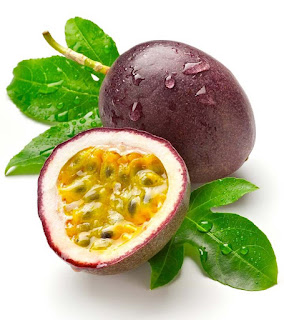Passion fruit, also known as Passiflora edulis, is a tropical fruit with a unique flavor and numerous potential health benefits. Here are some benefits associated with consuming passion fruit:
Rich in Antioxidants:
Passion fruit is loaded with antioxidants, including vitamin C, beta-carotene, and flavonoids. These antioxidants help protect the body against oxidative stress, neutralize harmful free radicals, and reduce the risk of chronic diseases.
Immune System Support:
The high vitamin C content in passion fruit contributes to a healthy immune system. Vitamin C boosts the production of white blood cells and antibodies, helping to strengthen the body's defense against infections and illnesses.
Digestive Health:
Passion fruit is a good source of dietary fiber, which aids in healthy digestion and promotes regular bowel movements. The fiber content adds bulk to the stool, prevents constipation, and supports a healthy gut microbiome.
Heart Health:
Passion fruit contains heart-healthy nutrients, such as potassium and fiber. Potassium helps regulate blood pressure and maintain proper heart function, while dietary fiber can help lower cholesterol levels and reduce the risk of heart disease.
Skin Health:
The antioxidants in passion fruit contribute to healthy skin by protecting against oxidative damage, promoting collagen synthesis, and maintaining skin elasticity. Passion fruit oil is also used in skincare products for its moisturizing and nourishing properties.
Eye Health:
Passion fruit contains beneficial compounds like vitamin A and flavonoids, which are essential for maintaining good eye health. These nutrients help protect against age-related macular degeneration and promote optimal vision.
Anti-Inflammatory Properties:
Some compounds found in passion fruit, such as flavonoids and phenolic acids, have anti-inflammatory properties. Consuming passion fruit may help reduce inflammation in the body and alleviate symptoms associated with inflammatory conditions.
Weight Management:
Passion fruit is relatively low in calories and high in fiber, making it a satisfying fruit for weight management. The fiber content promotes feelings of fullness, reduces appetite, and supports healthy weight loss or maintenance.
Stress Relief:
Passion fruit contains certain compounds that have sedative and calming effects, which may help reduce anxiety and promote relaxation. It is often used as a natural remedy for stress and insomnia.
Nutrient Density:
Passion fruit is a nutrient-dense fruit, meaning it provides a significant amount of essential nutrients in relation to its calorie content. It is rich in vitamins, minerals, and antioxidants, making it a beneficial addition to a balanced diet.
Passion fruit can be enjoyed on its own, added to smoothies, used in desserts, or incorporated into various recipes. Including passion fruit as part of a diverse and nutritious diet can provide you with its potential health benefits.

Comments
Post a Comment